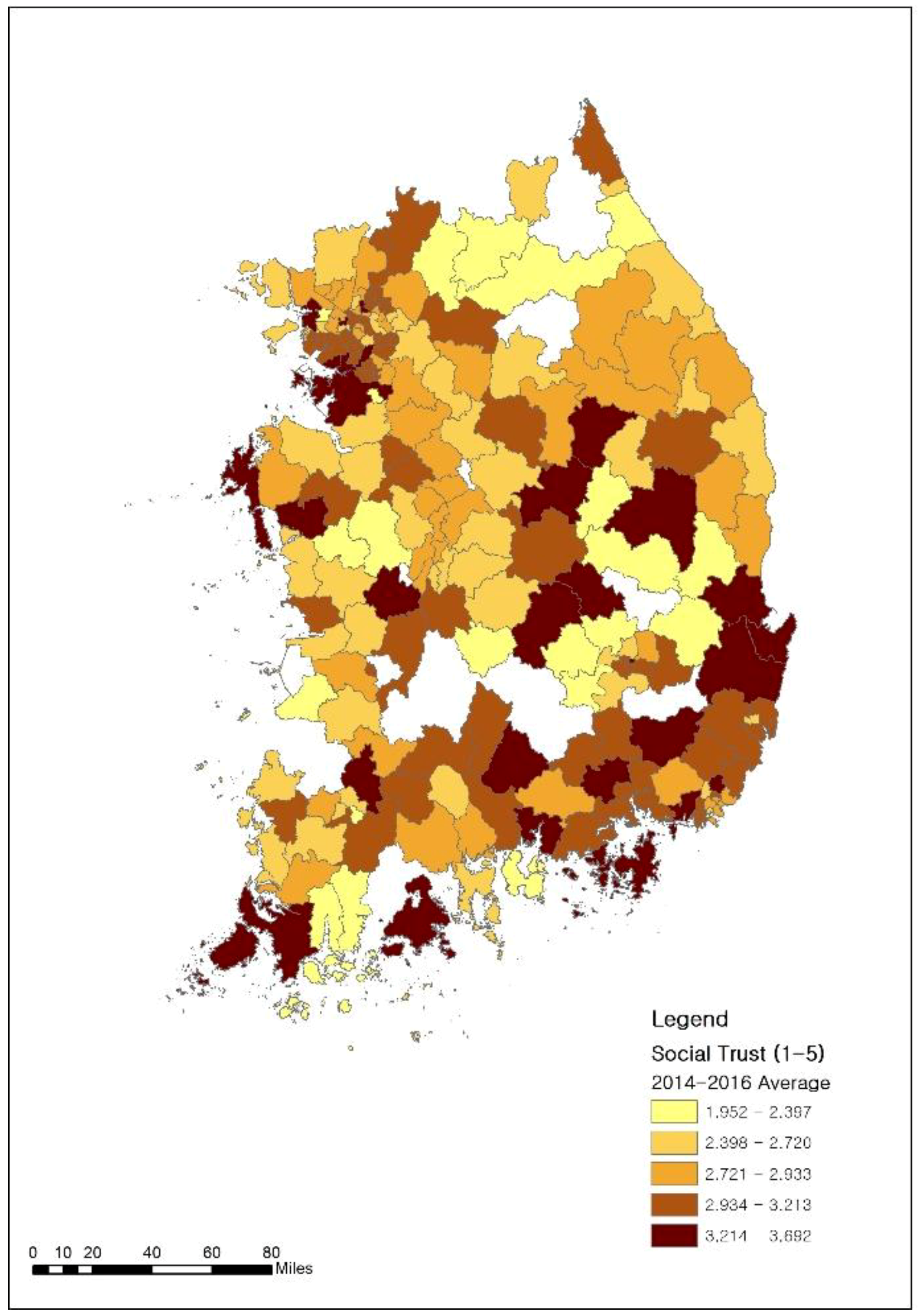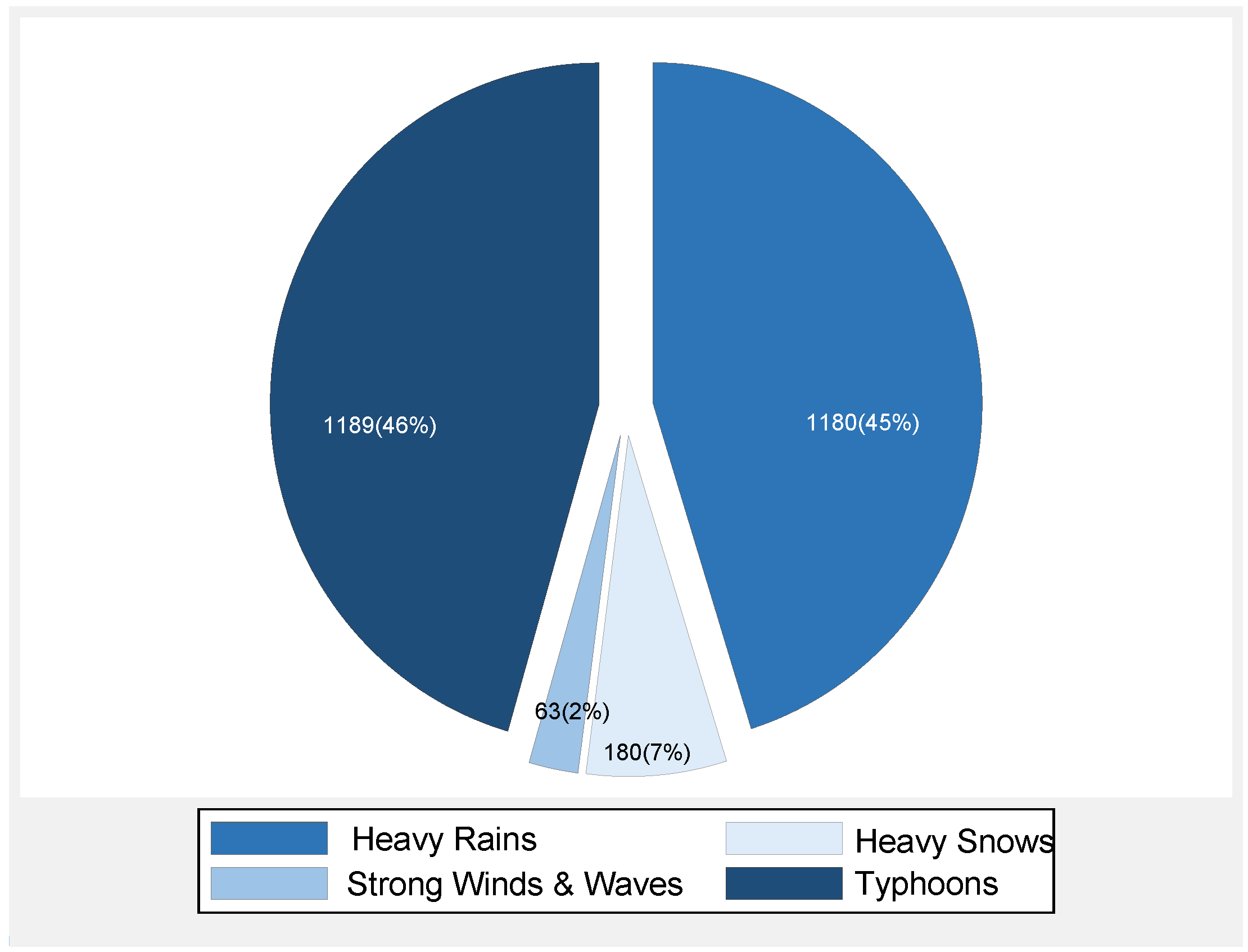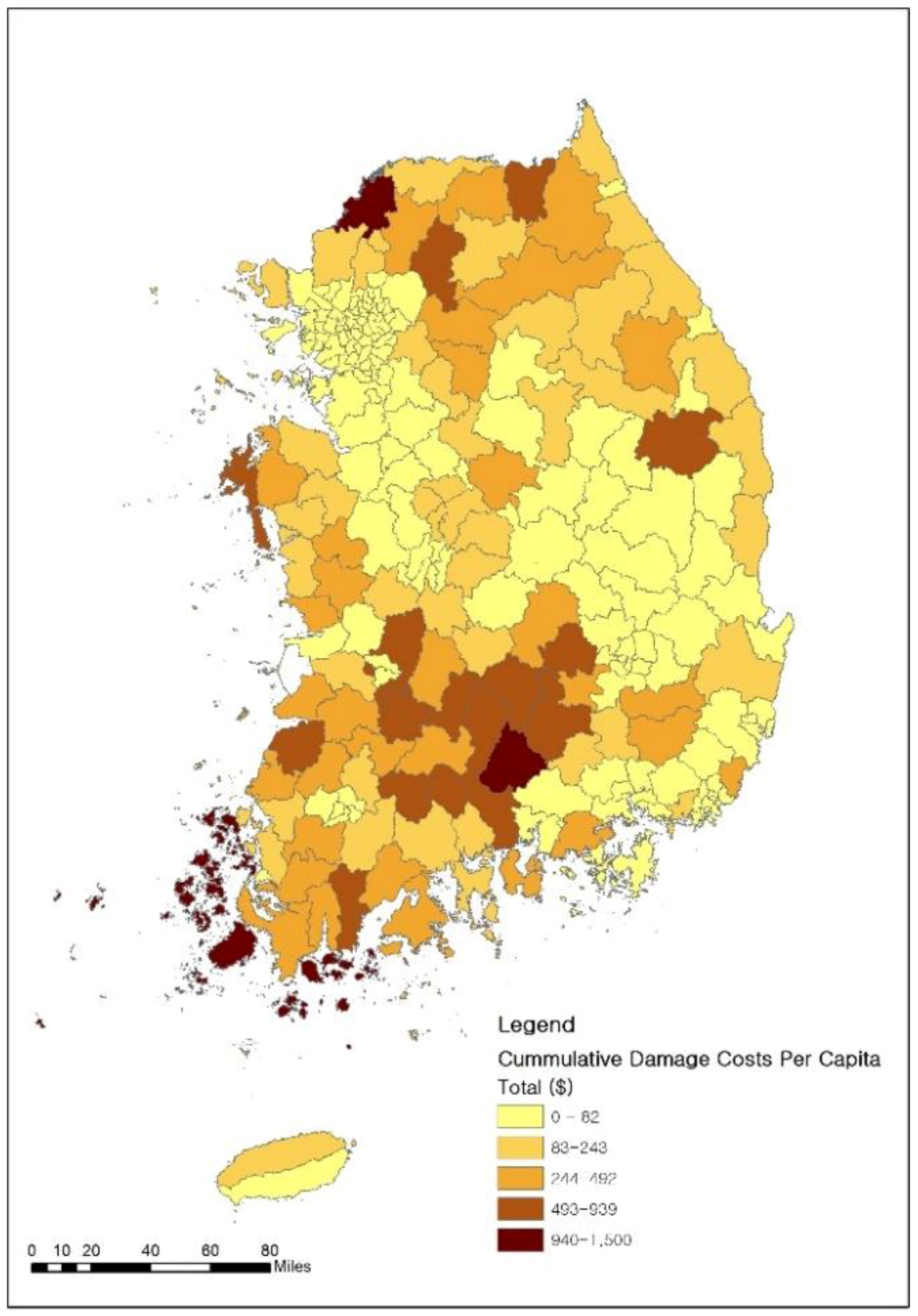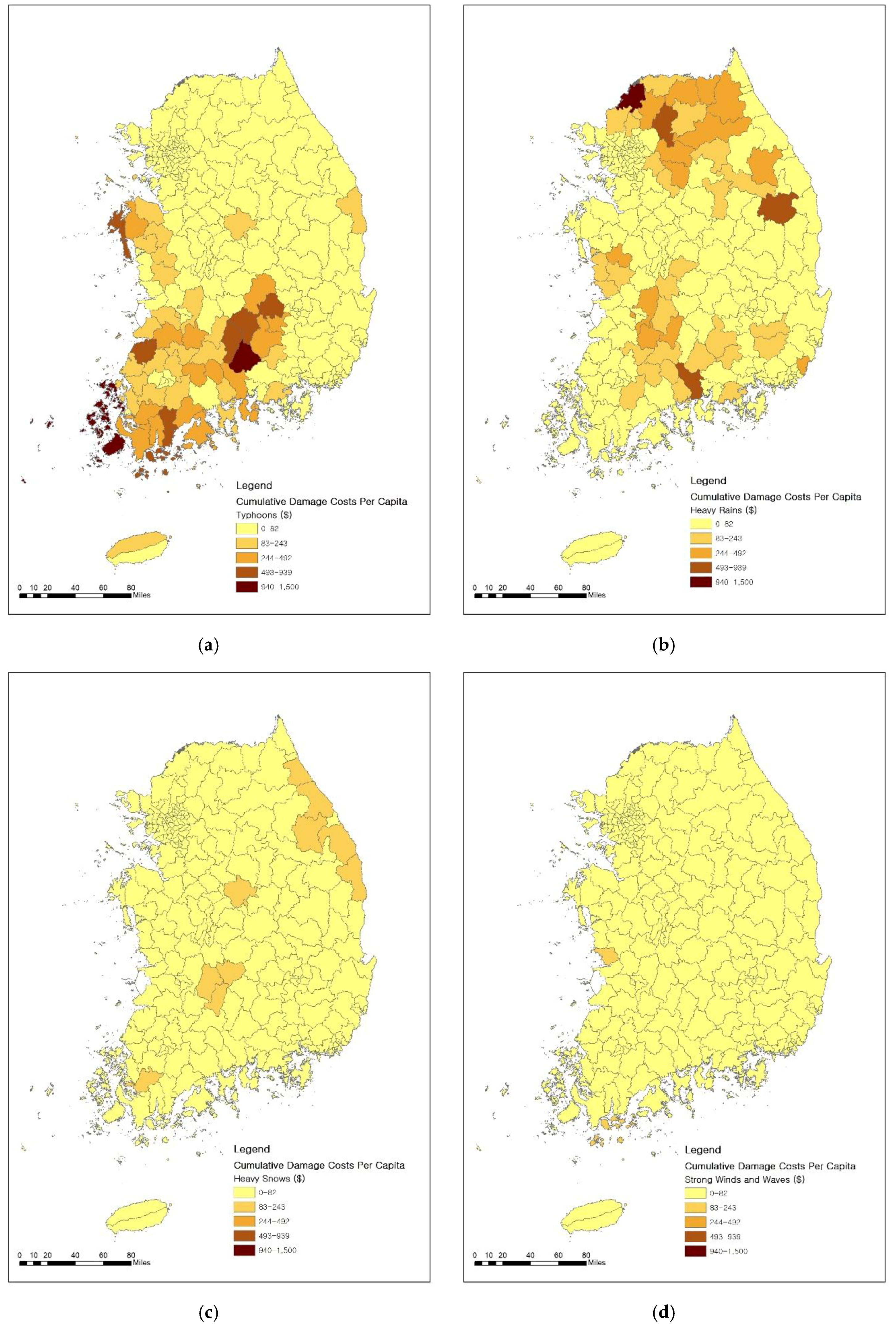The Effects of Natural Disasters on Social Trust: Evidence from South Korea
Abstract
1. Introduction
2. Literature Review
3. Key Variables and Data
3.1. Social Trust
3.2. Natural Disasters
3.3. Other Explanatory Variables
4. Empirical Models and Results
4.1. Empirical Models
- : The natural logarithm variable of [income +1]
- : The natural logarithm variable of [housing price i + 1]
- : The ratio of people aged 20–39 to those aged over 65
- : The natural logarithm variable of population
- : Financial independence rate
- : Year dummy variables
4.2. Regression Results
5. Discussion
6. Conclusions
- An increase in cumulative total disaster damage costs per capita is associated with an increase in social trust levels.
- In the cases of heavy rain, heavy snow and strong winds and waves, an increase in cumulative damage costs per capita is associated with an increase in social trust levels.
- In the case of typhoons, an increase in cumulative damage costs per capita is associated with a decrease in social trust levels.
Author Contributions
Funding
Acknowledgments
Conflicts of Interest
References
- Cvetkovich, G. Social Trust and the Management of Risk; Routledge: Abingdon, UK, 2013. [Google Scholar]
- Earle, T.C.; Siegrist, M.; Gutscher, H. Trust in Risk Management: Uncertainty and Scepticism in the Public Mind; Earthscan: London, UK, 2010. [Google Scholar]
- Slovic, P. Perceived risk, trust, and democracy. Risk Anal. 1993, 13, 675–682. [Google Scholar] [CrossRef]
- Bostrom, A.; Atkinson, E. Trust in Cooperative Risk management: Uncertainty and scepticism in the public mind. In Trust and Risk in Smallpox Vaccination; Routledge: Abingdon, UK, 2007; pp. 173–186. [Google Scholar]
- Stern, P.C.; Kalof, L.; Dietz, T.; Guagnano, G.A. Values, beliefs, and proenvironmental action: Attitude formation toward emergent attitude objects 1. J. Appl. Soc. Psychol. 1995, 25, 1611–1636. [Google Scholar] [CrossRef]
- Arvai, J.; Rivers, L., III. Effective Risk Communication; Routledge: Abingdon-on-Thames, UK, 2013. [Google Scholar]
- Earle, T.C.; Cvetkovich, G. Social Trust: Toward a Cosmopolitan Society; Greenwood Publishing Group: Santa Barbara, CA, USA, 1995. [Google Scholar]
- Earle, T.C.; Cvetkovich, G. Social trust and culture in risk management. In Social Trust and the Management of Risk; Cvetkovich, G., Lofstedt, R., Eds.; Routledge: London, UK, 1999; pp. 9–21. [Google Scholar]
- Earle, T.C.; Siegrist, M.; Gutscher, H. Trust, risk perception and the tcc model of cooperation. In Trust in risk Management: Uncertainty and Scepticism in the Public Mind; Siegrist, M., Earle, T.C., Gutscher, H., Eds.; Routledge: London, UK; New York, NK, USA, 2010; pp. 1–50. [Google Scholar]
- Siegrist, M.; Earle, T.C.; Gutscher, H. Test of a trust and confidence model in the applied context of electromagnetic field (EMF) risks. Risk Anal. 2003, 23, 705–716. [Google Scholar] [CrossRef] [PubMed]
- Uslaner, E.M. Trust and risk: Implications for management. In Trust in Risk Management; Routledge: London, UK, 2010; pp. 88–108. [Google Scholar]
- Putnam, R.D. Bowling alone: America’s declining social capital. J. Democr. 1995, 6, 65–78. [Google Scholar] [CrossRef]
- Fukuyama, F. Trust: The Social Virtues and the Creation of Prosperity; Free Press Paperbacks: New York, NY, USA, 1995. [Google Scholar]
- Warren, M.R.; Thompson, J.P.; Saegert, S. The role of social capital in combating poverty. Soc. Capital Poor Commun. 2001, 3, 1–28. [Google Scholar]
- Toya, H.; Skidmore, M. Do natural disasters enhance societal trust? Kyklos 2014, 67, 255–279. [Google Scholar] [CrossRef]
- Emery, M.; Flora, C. Spiraling-up: Mapping community transformation with community capitals framework. Community Dev. 2006, 37, 19–35. [Google Scholar] [CrossRef]
- Hsiang, S.M.; Burke, M.; Miguel, E. Quantifying the influence of climate on human conflict. Science 2013, 341, 1235367. [Google Scholar] [CrossRef] [PubMed]
- Bhavnani, R. Natural Disaster Conflicts; Harvard University: Cambridge, MA, USA, 2006; (Unpublished manuscript). [Google Scholar]
- Brancati, D. Political aftershocks: The impact of earthquakes on intrastate conflict. J. Confl. Resolut. 2007, 51, 715–743. [Google Scholar] [CrossRef]
- Calo-Blanco, A.; Kovářík, J.; Mengel, F.; Romero, J.G. Natural disasters and indicators of social cohesion. PLoS ONE 2017, 12, e0176885. [Google Scholar] [CrossRef] [PubMed]
- Skidmore, M.; Toya, H. Do natural disasters promote long-run growth? Econ. Inq. 2002, 40, 664–687. [Google Scholar] [CrossRef]
- Schumpeter, J. Creative destruction. Cap. Socialism Democr. 1942, 825, 82–85. [Google Scholar]
- Cuaresma, C.J.; Hlouskova, J.; Obersteiner, M. Natural disasters as creative destruction? Evidence from developing countries. Econ. Inq. 2008, 46, 214–226. [Google Scholar] [CrossRef]
- Leiter, A.M.; Oberhofer, H.; Raschky, P.A. Creative disasters? Flooding effects on capital, labour and productivity within european firms. Environ. Resour. Econ. 2009, 43, 333–350. [Google Scholar] [CrossRef]
- Bjørnskov, C.; Méon, P.-G. The productivity of trust. World Dev. 2015, 70, 317–331. [Google Scholar] [CrossRef]
- Knack, S.; Keefer, P. Does social capital have an economic payoff? A cross-country investigation. Q. J. Econ. 1997, 112, 1251–1288. [Google Scholar] [CrossRef]
- Dinda, S. Social capital in the creation of human capital and economic growth: A productive consumption approach. J. Socio-Econ. 2008, 37, 2020–2033. [Google Scholar] [CrossRef]
- Rupasingha, A.; Goetz, S.J.; Freshwater, D. Social capital and economic growth: A county-level analysis. J. Agric. Appl. Econ. 2000, 32, 565–572. [Google Scholar] [CrossRef]
- Cassar, A.; Healy, A.; Von Kessler, C. Trust, risk, and time preferences after a natural disaster: Experimental evidence from thailand. World Dev. 2017, 94, 90–105. [Google Scholar] [CrossRef]
- Shupp, R.; Loveridge, S.; Skidmore, M.; Lim, J.; Rogers, C. Trust and patience after a tornado. Weather Clim. Soc. 2017, 9, 659–668. [Google Scholar] [CrossRef]
- Dussaillant, F.; Guzmán, E. Trust via disasters: The case of chile’s 2010 earthquake. Disasters 2014, 38, 808–832. [Google Scholar] [CrossRef] [PubMed]
- Miller, D.S. Visualizing the corrosive community: Looting in the aftermath of hurricane katrina. Space Cult. 2006, 9, 71–73. [Google Scholar] [CrossRef]
- Fleming, D.A.; Chong, A.; Bejarano, H.D. Trust and reciprocity in the aftermath of natural disasters. J. Dev. Stud. 2014, 50, 1482–1493. [Google Scholar] [CrossRef]
- Papanikolaou, V.; Adamis, D.; Mellon, R.C.; Prodromitis, G.; Kyriopoulos, J. Trust, social and personal attitudes after wildfires in a rural region of greece. Sociol. Mind 2012, 2, 87–94. [Google Scholar] [CrossRef]
- Ahsan, D.A. Does natural disaster influence people’s risk preference and trust? An experiment from cyclone prone coast of bangladesh. Int. J. Disaster Risk Reduct. 2014, 9, 48–57. [Google Scholar] [CrossRef]
- Uslaner, E.M. Trust as a moral value. In The Handbook of Social Capital; Castiglione, D., Deth Van, J.W., Wolleb, G., Eds.; Oxford University Press: Oxford, UK, 2008; pp. 101–121. [Google Scholar]
- Nannestad, P. What have we learned about generalized trust, if anything? Annu. Rev. Political Sci. 2008, 11, 413–436. [Google Scholar] [CrossRef]
- Uslaner, E.M. Measuring generalized trust: In defense of the ‘standard’question. In Handbook of Research Methods on Trust; Lyon, F., Mšllering, G., Saunders, M.N., Eds.; Edward Elgar Publishing: Cheltenham, UK, 2012; Volume 72. [Google Scholar]
- Glaeser, E.L.; Laibson, D.I.; Scheinkman, J.A.; Soutter, C.L. Measuring trust. Q. J. Econ. 2000, 115, 811–846. [Google Scholar] [CrossRef]
- Wollebaek, D.; Selle, P. Does participation in voluntary associations contribute to social capital? The impact of intensity, scope, and type. Nonprofit Volunt. Sect. Q. 2002, 31, 32–61. [Google Scholar] [CrossRef]
- Bjørnskov, C. Determinants of generalized trust: A cross-country comparison. Public Choice 2007, 130, 1–21. [Google Scholar] [CrossRef]
- Delhey, J.; Newton, K. Who trusts? The origins of social trust in seven societies. Eur. Soc. 2003, 5, 93–137. [Google Scholar] [CrossRef]
- De Mello, L.R., Jr. Can fiscal decentralization strengthen social capital? Public Financ. Rev. 2004, 32, 4–35. [Google Scholar] [CrossRef]
- De Mello, L. Does fiscal decentralisation strengthen social capital? Cross-country evidence and the experiences of brazil and indonesia. Environ. Plan. C Gov. Policy 2011, 29, 281–296. [Google Scholar] [CrossRef]
- Widmalm, S. Decentralisation, Corruption and Social Capital: From India to the West; SAGE Publications India: New Delhi, India, 2008. [Google Scholar]
- Dincer, O. Fiscal decentralization and trust. Public Financ. Rev. 2010, 38, 178–192. [Google Scholar] [CrossRef]
- Brandt, M.J.; Wetherell, G.; Henry, P. Changes in income predict change in social trust: A longitudinal analysis. Polit. Psychol. 2015, 36, 761–768. [Google Scholar] [CrossRef]
- Mundlak, Y. On the pooling of time series and cross section data. Econom. J. Econom. Soc. 1978, 46, 69–85. [Google Scholar] [CrossRef]
- Chamberlain, G. Analysis of covariance with qualitative data. Rev. Econ. Stud. 1980, 47, 225–238. [Google Scholar] [CrossRef]
- Pelling, M. What determines vulnerability to floods; a case study in georgetown, guyana. Environ. Urban 1997, 9, 203–226. [Google Scholar] [CrossRef]
- Few, R. Flooding, vulnerability and coping strategies: Local responses to a global threat. Prog. Dev. Stud. 2003, 3, 43–58. [Google Scholar] [CrossRef]
- Rothstein, B.; Uslaner, E.M. All for all: Equality, corruption, and social trust. World Politics. 2005, 58, 41–72. [Google Scholar] [CrossRef]
- Levi, M.; Stoker, L. Political trust and trustworthiness. Annu. Rev. Politics. Sci. 2000, 3, 475–507. [Google Scholar] [CrossRef]
- Pierce, J.; Lovrich, N.; Johnson, B.; Reames, T.; Budd, W. Social capital and longitudinal change in sustainability plans and policies: Us cities from 2000 to 2010. Sustainability 2014, 6, 136–157. [Google Scholar] [CrossRef]
- Bae, Y.; Joo, Y.-M.; Won, S.-Y. Decentralization and collaborative disaster governance: Evidence from south korea. Habitat Int. 2016, 52, 50–56. [Google Scholar] [CrossRef]
- Yoon, D.K. Disaster policies and emergency management in korea. In Disaster and Development; Springer: Berlin, Germany, 2014; pp. 149–164. [Google Scholar]
- Brundiers, K.; Eakin, H.C. Leveraging post-disaster windows of opportunities for change towards sustainability: A framework. Sustainability 2018, 10, 1390. [Google Scholar] [CrossRef]




| Year | Obs. | Mean | Std. Dev. |
|---|---|---|---|
| 2014 | 4258 | 3.023 | 0.951 |
| 2015 | 4258 | 3.194 | 0.877 |
| 2016 | 4258 | 2.409 | 0.876 |
| Values | 2014 | 2015 | 2016 | Average across the Three Years |
|---|---|---|---|---|
| 5: Very reliable | 4.34% | 0.89% | 0.63% | 1.95% |
| 4: Reliable | 29.85% | 43.00% | 7.61% | 26.82% |
| 3: Neutral | 33.02% | 35.09% | 40.61% | 36.24% |
| 2: Unreliable | 29.29% | 16.65% | 34.36% | 26.77% |
| 1: Very unreliable | 3.05% | 4.37% | 16.79% | 8.07% |
| Disasters | Private Properties | Public Facilities | Total | ||
|---|---|---|---|---|---|
| Unit | 1000$ | % | 1000$ | % | 1000$ |
| A | C/A × 100 | B | B/C × 100 | C = A + B | |
| Total | 23,014.3 | 30.78 | 90,155.3 | 69.22 | 113,169.7 |
| Heavy Rains | 5228.7 | 24.98 | 83,639.0 | 75.05 | 88,867.7 |
| Heavy Snows | 15,574.3 | 95.95 | 1160.0 | 4.05 | 16,734.0 |
| Typhoons | 1151.0 | 16.89 | 4856.7 | 83.12 | 6007.3 |
| Strong Winds and Waves | 1060.7 | 68.00 | 500.0 | 32.40 | 1560.3 |
| Variables | Obs. | Mean | S. E. | Source |
|---|---|---|---|---|
| Social Trust (S_T) | 12,687 | 2.87 | 0.96 | The survey conducted by KIPF |
| Cumulative Damage Costs per Capita ($) | ||||
| Total (T_D) | 12,687 | 68.33 | 139.55 | Yearbook of Disasters published by the NEMA |
| Heavy Rains (H_Rain) | 12,687 | 33.23 | 100.83 | |
| Typhoons (Typh) | 12,687 | 27.49 | 72.28 | |
| Heavy Snows (H_Snow) | 12,687 | 5.68 | 17.31 | |
| Strong Winds and Waves (St_WW) | 12,687 | 1.92 | 13.29 | |
| Personal Income ($) (INC) | 12,687 | 2488 | 2974 | The survey conducted by KIPF |
| Housing Values (H_V) | 12,687 | 138,678 | 208,474 | The survey conducted by KIPF |
| The Ratio of People Aged 20–39 to Those Aged Over 65 (%) (Y_ORatio) | 12,687 | 2.39 | 0.98 | Resident registration demographics, MOI |
| Population (POP) | 12,687 | 390,462 | 270,479 | Resident registration demographics, MOI |
| Financial Independence Rate (%) (Fin_Indp_Rate) | 12,687 | 32.86 | 13.99 | Local finance open system, MOI |
| Models | (1) FE | (2) FE | (3) RE Ordered Probit | (4) RE Ordered Probit |
|---|---|---|---|---|
| Dependent Variables | S_T | S_T | S_T | S_T |
| ln[T_D] t − 1 | 0.149 *** | 0.190 *** | ||
| (0.042) | (0.053) | |||
| ln[H_Rain] t − 1 | 0.177 *** | 0.226 *** | ||
| (0.042) | (0.053) | |||
| ln[H_Snow] t − 1 | 0.291 *** | 0.353 *** | ||
| (0.056) | (0.068) | |||
| ln[Typ] t − 1 | −0.582 *** | −0.789 *** | ||
| (0.105) | (0.156) | |||
| ln[St_WW] t − 1 | 0.599 *** | 0.765 *** | ||
| (0.132) | (0.166) | |||
| ln[INC] t − 1 | −0.007 | −0.007 | −0.010 | −0.010 |
| (0.014) | (0.014) | (0.018) | (0.018) | |
| ln[H_V] t − 1 | −0.011 ** | −0.011 ** | −0.014 ** | −0.014 ** |
| (0.005) | (0.005) | (0.007) | (0.007) | |
| Y_ORatio t − 1 | 0.451 *** | 0.293 * | 0.589 *** | 0.390 * |
| (0.163) | (0.165) | (0.205) | (0.209) | |
| Fin_Ind_Rate t − 1 | 0.013 *** | 0.013 *** | 0.015 ** | 0.015 ** |
| (0.005) | (0.005) | (0.006) | (0.006) | |
| ln[POP] t − 1 | −0.221 | −0.163 | −0.328 | −0.252 |
| (0.510) | (0.517) | (0.631) | (0.644) | |
| 2015 dummy | 0.238 *** | 0.196 *** | 0.279 *** | 0.228 *** |
| (0.031) | (0.032) | (0.039) | (0.040) | |
| 2016 dummy | −0.488 *** | −0.553 *** | −0.605 *** | −0.688 *** |
| (0.049) | (0.050) | (0.061) | (0.064) | |
| Constant | 3.978 | 4.196 | ||
| (6.207) | (6.315) | |||
| Cut1 | −0.753 *** | −0.374 | ||
| (0.250) | (0.254) | |||
| Cut2 | 0.390 | 0.775 *** | ||
| (0.250) | (0.254) | |||
| Cut3 | 1.481 *** | 1.871 *** | ||
| (0.250) | (0.254) | |||
| Cut4 | 3.172 *** | 3.566 *** | ||
| −0.253 | (0.257) | |||
| Obs. | 12,687 | 12,687 | 12,687 | 12,687 |
| R-squared or Pseudo R-squared | 0.194 | 0.200 | 0.054 | 0.057 |
| Models | (1) RE Probit | (2) RE Probit | (3) RE Probit | (4) RE Probit |
|---|---|---|---|---|
| Dependent Variables | Binary Variable of S_T | Binary Variable of S_T | Binary Variable of S_T | Binary Variable of S_T |
| RE Probit Estimation | RE Probit Estimation | Marginal Effects | Marginal Effects | |
| ln[T_D] t − 1 | 0.418 *** | 0.116 *** | ||
| (0.083) | (0.023) | |||
| ln[H_Rain] t − 1 | 0.386 *** | 0.107 *** | ||
| (0.083) | (0.023) | |||
| ln[H_Snow] t − 1 | 0.336 *** | 0.093 *** | ||
| (0.091) | (0.025) | |||
| ln[Typ] t − 1 | −0.332 | −0.092 | ||
| (0.214) | (0.059) | |||
| ln[St_WW] t − 1 | 0.646 *** | 0.179 *** | ||
| (0.238) | (0.066) | |||
| ln[INC] t − 1 | −0.007 | −0.008 | −0.002 | −0.002 |
| (0.023) | (0.023) | 0.006 | (0.006) | |
| ln[H_V] | −0.017 * | −0.016 * | −0.005 * | −0.004 * |
| (0.010) | (0.010) | 0.003 | (0.003) | |
| Y_ORatio t − 1 | 0.914 *** | 0.705 ** | 0.254 *** | 0.196 *** |
| (0.310) | (0.315) | 0.086 | (0.087) | |
| Fin_Ind_Rate t − 1 | 0.002 | 0.002 | 0.001 | 0.001 |
| (0.008) | (0.008) | 0.002 | (0.002) | |
| ln[POP] t − 1 | −0.433 | −0.437 | −0.120 | −0.121 |
| (0.960) | (0.994) | 0.267 | (0.276) | |
| 2015 dummy | 0.383 *** | 0.338 *** | 0.106 *** | 0.094 *** |
| (0.053) | (0.055) | (0.015) | (0.015) | |
| 2016 dummy | −0.864 *** | −0.947 *** | −0.240 *** | −0.263 *** |
| (0.089) | (0.094) | (0.025) | (0.026) | |
| Constant | −0.862 *** | −1.275 *** | ||
| (0.328) | (0.339) | |||
| Obs. | 12,687 | 12,687 | 12,687 | 12,687 |
| Pseudo R-squared | 0.115 | 0.118 |
© 2018 by the authors. Licensee MDPI, Basel, Switzerland. This article is an open access article distributed under the terms and conditions of the Creative Commons Attribution (CC BY) license (http://creativecommons.org/licenses/by/4.0/).
Share and Cite
Kang, S.H.; Skidmore, M. The Effects of Natural Disasters on Social Trust: Evidence from South Korea. Sustainability 2018, 10, 2973. https://doi.org/10.3390/su10092973
Kang SH, Skidmore M. The Effects of Natural Disasters on Social Trust: Evidence from South Korea. Sustainability. 2018; 10(9):2973. https://doi.org/10.3390/su10092973
Chicago/Turabian StyleKang, Sung Hoon, and Mark Skidmore. 2018. "The Effects of Natural Disasters on Social Trust: Evidence from South Korea" Sustainability 10, no. 9: 2973. https://doi.org/10.3390/su10092973
APA StyleKang, S. H., & Skidmore, M. (2018). The Effects of Natural Disasters on Social Trust: Evidence from South Korea. Sustainability, 10(9), 2973. https://doi.org/10.3390/su10092973





